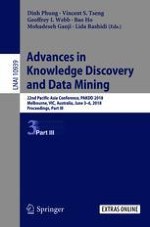2018 | OriginalPaper | Buchkapitel
Scalable Model-Based Cascaded Imputation of Missing Data
verfasst von : Jacob Montiel, Jesse Read, Albert Bifet, Talel Abdessalem
Erschienen in: Advances in Knowledge Discovery and Data Mining
Aktivieren Sie unsere intelligente Suche, um passende Fachinhalte oder Patente zu finden.
Wählen Sie Textabschnitte aus um mit Künstlicher Intelligenz passenden Patente zu finden. powered by
Markieren Sie Textabschnitte, um KI-gestützt weitere passende Inhalte zu finden. powered by
